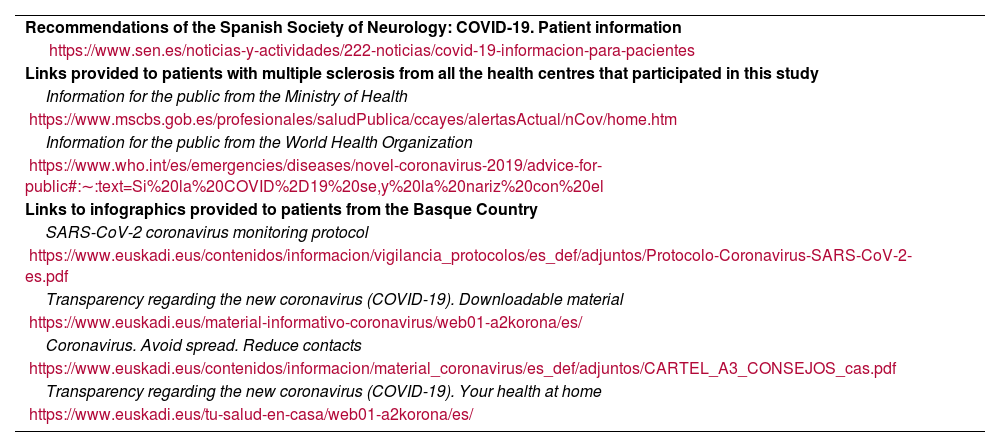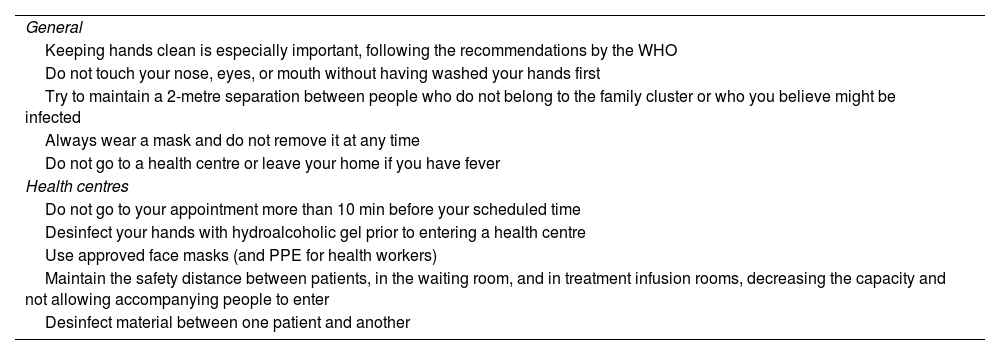At the beginning of the SARS-CoV-2 pandemic, health centres were places where there was a high risk of infection, and during the period of lockdown face-to-face health care was substantially reduced, forcing rapid changes in the care of multiple sclerosis patients by the specialised nursing staff in the units and monographic consultations of this disease.
DevelopmentThe experience of the nursing staff of multiple sclerosis units and monographic consultations, in 8 Spanish hospitals, is collected from the beginning of the pandemic and in later stages, and the adaptations that they made to continue caring for patients are specifically described. The scientific literature about how the SARS-CoV-2 has affected patients with multiple sclerosis is also reviewed, as well as the experiences of other multiple sclerosis teams in health centres in other countries.
ConclusionsDuring the lockdown and in later stages, new forms and previously little used forms of care were applied to multiple sclerosis patients. The nursing staff kept contact with them by telephone and online, provided them with information about safety and behaviour in relation to COVID-19. Face-to-face visits, treatments and distribution of medication were adapted. Information was provided about how patients could receive psychosocial support and about how they could maintain their quality of life.
Al comienzo de la pandemia por el virus SARS-CoV-2, los centros sanitarios fueron lugares de alto riesgo de infección y, durante el período de confinamiento, la asistencia sanitaria presencial se redujo notablemente, lo que obligó a realizar cambios rápidos en la atención a los pacientes de esclerosis múltiple por parte de la enfermería especializada en las unidades y consultas monográficas de esta enfermedad.
DesarrolloSe recoge la experiencia del personal de enfermería de las unidades y consultas monográficas de esclerosis múltiple en 8 hospitales de España desde el comienzo de la pandemia y en etapas posteriores. Concretamente, se exponen las adaptaciones que realizaron para continuar atendiendo a los pacientes durante estos períodos. También se revisa la literatura científica acerca de cómo ha afectado el SARS-CoV-2 a los pacientes con esclerosis múltiple, así como las experiencias de equipos de esclerosis múltiple en centros sanitarios de otros países.
ConclusionesDurante el confinamiento y en etapas posteriores se aplicaron formas de atención a los pacientes de esclerosis múltiple nuevas o poco empleadas con anterioridad. El personal de enfermería mantuvo el contacto con ellos por teléfono y vía telemática, proporcionando información sobre medidas de seguridad y protección frente a la infección por SARS-CoV-2, adaptando las visitas presenciales, los tratamientos y la distribución de la medicación, facilitando información para que los pacientes pudieran recibir apoyo psicosocial y sobre cómo mantener su calidad de vida.
Article
Diríjase al área privada de socios de la web de la SEDENE, (https://sedene.com/revista-de-sedene/ ) y autentifíquese.






